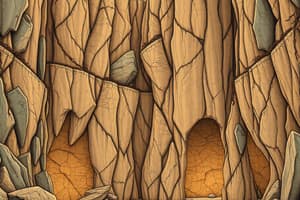Podcast
Questions and Answers
What is the principle of original horizontality?
What is the principle of original horizontality?
The Principle of Original Horizontality states that layers of sediment are originally deposited horizontally under the action of gravity.
What is the principle of lateral continuity?
What is the principle of lateral continuity?
The principle of lateral continuity states that layers of sediment initially extend laterally in all directions.
Does age generally increase or decrease with depth?
Does age generally increase or decrease with depth?
Age generally increases with depth.
What do original horizontality, lateral continuity, and age-depth relationship tell us about deformed rocks?
What do original horizontality, lateral continuity, and age-depth relationship tell us about deformed rocks?
What is a cross-cutting relationship?
What is a cross-cutting relationship?
What is relative age dating?
What is relative age dating?
What is inclusion in geology?
What is inclusion in geology?
Know how to date geologic features and structures relative to one another, describe the processes that may have caused certain features or structures to occur, and ____.
Know how to date geologic features and structures relative to one another, describe the processes that may have caused certain features or structures to occur, and ____.
Flashcards are hidden until you start studying
Study Notes
Principles of Geology
- Original Horizontality: Suggests sediment layers are initially deposited horizontally due to gravity, important for analyzing folded or tilted strata.
- Lateral Continuity: Indicates sediment layers extend continuously in all directions unless interrupted by erosional features like valleys; similarities in separated rocks imply original continuity.
Age-Depth Relationship
- Age vs. Depth: Rock age generally increases with depth; deeper formations tend to be older.
Interpretation of Deformed Rocks
- Deformation Analysis: When original principles are violated in deformed rocks, it reveals magnitude and direction of rock movement, indicating the types and extent of geological changes.
Cross-Cutting Relationships
- Geological Dating: This principle posits that the feature which cuts another is younger, thus aiding in relative dating and understanding geological timelines.
Relative Age Dating
- Understanding Relative Age: This method determines the sequence of geological events and ages of objects relative to each other without defining absolute ages. It involves assessing rock ages in the context of neighboring formations.
Inclusions
- Inclusion Significance: Represents a scenario where one rock type is enclosed within another. This implies that the surrounding rock is younger than the rock encased within it.
Skills in Geology
- Dating Features: Ability to date geological structures in relation to one another.
- Feature Analysis: Describe processes responsible for the formation of geological features.
- Geologic History Reconstruction: Combine relative dating techniques with knowledge of geological processes to reconstruct the historical context of an area.
Studying That Suits You
Use AI to generate personalized quizzes and flashcards to suit your learning preferences.




